Education is not preparation for life; education is life itself.
– John Dewey
Pension Sprachschule Maria Shipley
A place to find teachers and books for learning - for more information about this website click on the "About" links
Oberursel, home to Frankfurt International School (FIS), has a lot to offer. Sunday’s fest, Herbsttreiben, was held in the old part of town, and we noticed many curious newcomers. Also overheard a German explain our Grüne Soß’ to someone in English. The poor lady could not think of the word herbs, so she said the Grüne Soß’ was made from green “things”. It surely is!
Here we have the local Mayor Brum (second from left) with some of the fest’s representatives.
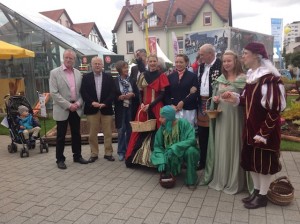
Scary looking jester. By the way, the last British king to employ a jester was Charles I, which was more than 300 years ago.

The fair also had old machinery on display such as this saw and wood splitter vehicle (dates probably back to 1934). The German description read: Selbstfahrende Bandsäge mit Holzspalter.
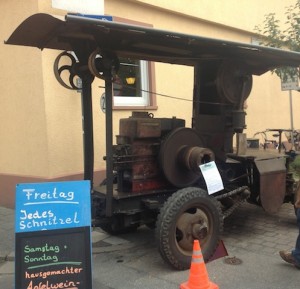
This Ebbelquetscher (apple press) was run by two young men, showing how apples were pressed in the old days.

Ebbelquetscher
Here goes one of the many buckets it took to fill up the tub below.
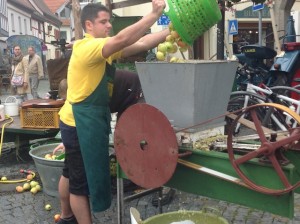
Men at work
The fest might have been a wash-out on Saturday as it rained most of the day. We got lucky on Sunday as it stayed dry.
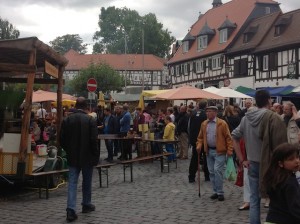
Oberursel
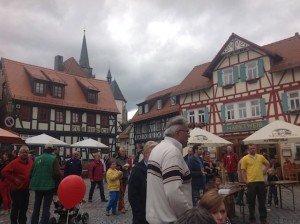
Oberursel had its annual apple wine contest.

Ebbelwoi Contest
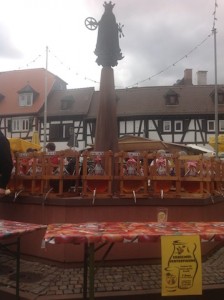
Oberursel is a good place to live.
Jack Stites, a former U.S. Army soldier and now a retired police officer, was stationed in Oberursel at the Motorenfabrik (Motor Pool) from January 1954 to January 1955, and he loved every minute of his time there. Now, almost 60 years later, he is here to share some memories with us.
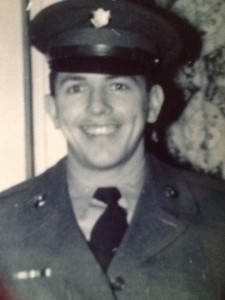
Jack Stites in 1954
1) In what ways was Oberursel different to the places you were previously stationed?
The difference between Oberursel and other stations was that it was very low key, and like a regular job. We got up in the morning, went to roll call and then to breakfast. After P.T. we were off to our assigned jobs.
We were a Direct Auto Support. We repaired vehicles from all over Germany. When a vehicle came that needed an engine, our mechanics took the engine out and put it in a crate, then put another one in the vehicle. We just replaced engines — not overhaulling them.
I had been to 14 weeks of wheel vehicle repair at Atlanta General Depot. Then to Red River Arsenal in Texarkana, where I packed wheel bearings in trucks, which really doesn’t need any schooling. Duh.
Then to Oberursel, finally! After arriving there, they discovered that I had been a truck driver in civilian life. They assigned me to a M62 wrecker, where I evacuated vehicles that were in need of repair and brought them back to our base. 14 weeks of schooling wasted. I never touched a wrench while there. My job was to take the engines in crates to different military bases where German civilians overhauled them. I was very fortunate because I saw a lot of Germany through my job.
2) What sort of interaction was there between the Motorenfabrik and Camp King?
The only interaction with Camp King was the Post Exchange (PX). Camp King was a military intelligence center, and we were the grease balls from down the street.
3) What were your impressions of Germans and German culture? Did you have a favorite hangout in Oberursel?
As for the German culture, it was so interesting. For example, I had never seen leather coats, knapsacks on the school kids, and reflectors on bicycles’ pedals. These are things that we have here now. It just goes to show how far behind we are.
In regards to hang outs – at $91.30 a month, there wasn’t much hanging around. This is where I learned poverty is no crime. It’s just a helluva inconvenience. Across the street from our building, and about a block towards Camp King, there was a bar in the basement, and we used to go there for steak sandwiches and a beer. Not much, though. Poverty ruled.
4) Is there a particular memory that you would like to share?
There was an Enlisted Members (EM) club in town. The only time that I was there was during Fasching. Bad news!! There were four of us sitting at a little round table, drinking German white wine. When we couldn’t fit another bottle on the table — empty, that is — we decided to go home. Back at the camp, I crawled up the steps to the second floor. It wasn’t pretty.
The other place was in Bad Homburg, at the Texas bar. The funniest thing that happened was at the Texas bar. Claude Wiggins, a real redneck from the south, got drunk one night, then punched out a few of the windows in the bar, cutting a large slash in his wrist which could have been fatal. In front of the bar, he asked the owner how much he owed him, then paid him. It was quite a scare!!
5) How has the town changed from the way you remember it?
As far as if the town has changed? I really can’t say. My wife says it’s really built up! I wasn’t there to compare. My wife is the traveler.
Thanks so much, Jack, for sharing your story with us.
If you happen to be an expat moving to Oberursel, be prepared for a mostly quiet, beautiful, and regulated surrounding. Germans love their beer and wine fests, they do not shop on Sundays, and there are rules when you can party/make noise and not. You’ll get used to it, I’m sure.
Saturday is a busy day for most shoppers, since everything is closed on Sundays. I managed to get away from work for 40 minutes and took a short trip downtown to the market for a Fischbrötchen (marinated fish on a bread roll).
Oberursel’s market is located right at the market square and it’s a very pretty sight.
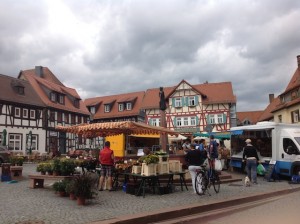
Saturday market day in Oberursel
When I went to order my Fischbrötchen, the lady told me she was out of bread rolls and asked me to get one from one of the other vendors. Once I come back with a bread roll, she could make it for me, she said. This is Germany at its best 🙂
Another view of the market with the ever-so-clean fountain.
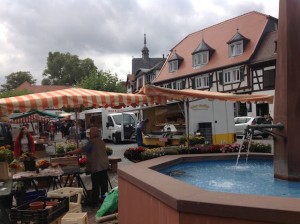
Next, we went down into the Altstadt, where they got ready to set up for the Seifenkistenrennen (soap box race).
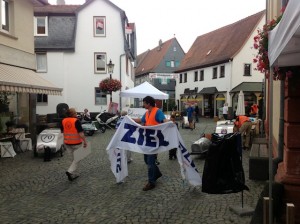
Soap box race, Oberursel
“Yes, it’s spelled correctly”, one of the guys seems to say.
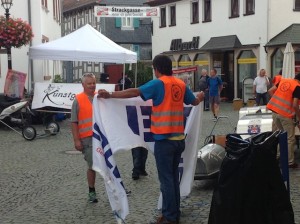
Does this look right to you?
Being a repat, but working expat hours, it is sometimes difficult to match my schedule to the German hours of operation.
But this should be the least of your concerns when living in Germany. It is safe, they have good beer, and are generally honest in business dealings.
This guest-post has been written by Thomas Shipley, a former Frankfurt International School (FIS) student and a current English Literature student at the University of Nottingham. And yes, we are related.
After spending months at home in post-IB rehabilitation, I wondered what living in England and going to university there was going to be like. Were the rumors of sleeping in, little work, and much partying true? Was English food going to be as bad as us continental Europeans make it out to be? Would I have difficulty making friends?
After a term at the University of Nottingham, I have already gotten my fair deal of student life! Freshers’ week, or week one of university, was probably one of the most exciting times of my life – seven days of meeting new people, going to clubs and events, and drinking. Lots of drinking! Oh and some introductory lectures too, let’s not forget about those.
Settling into my course wasn’t easy, as was the navigation around campus, enrolling myself into modules, and figuring out my timetable. I was so used to having my academic life all laid-out for me that it almost felt like too much freedom. Lectures were a bit daunting at first; two hundred students in one hall, all quiet, all listening to one professor’s voice. Seminars (lessons in a small group) felt like being in school again, just everybody was speaking in various English dialects.
As an international person, part-American part-German, I’ll admit that I felt a bit of an outsider in an otherwise quite homogenous group. Sure, there were foreigners – mostly Chinese – but otherwise I was surrounded by English people. The one thing that helped me along was the fact that English is my native tongue, albeit with an American accent, so the “wrong” type of English. At least that’s what the perpetual teasing has taught me. One English friend would greet me with a grin on his face, yelling at me in his best American accent: “Oh my gawd!” Since this fellow is a Northerner, I would retort: “Ay up!” (a typical Yorkshire greeting to a Lancastrian is not always advisable… see The Wars of the Roses for more information).
I guess what I like most about university life are the societies and the social life. However, there won’t be any more hall socials next year, as I’ll be forced to live in a flat. And maybe I’ll have too much work next year to attend any of the numerous societies’ (e.g., Philosophy Society, Chinese Society, Sailing Society) meetings; I already have a considerable amount of assignments as it is. But all that might get old anyway once I’m in year three. Who knows?
I wonder where my degree in English may lead me. I have a few ideas that I will delve into, such as journalism or advertising. A friend scoffed and asked, “A degree in English? You know what they say about English majors…” Some German friends and family have asked: “English? That’s a useful language to learn nowadays! It should be easy for him, he has an American father!” To them all I say: Well, then you try explaining to me Dickens’s view on the effects of utilitarian education and rapid industrialization on our society!

My name is Maria Shipley. I live in Oberursel, Germany, with my husband, son and daughter. The … Read more



Copyright © 2024 · Maria Shipley · Datenschutzerklärung · Impressum · Log in
Diese Webseite verwendet Cookies. Wenn Sie auf der Seite weitersurfen, stimmen Sie der Cookie-Nutzung zu. Mehr Informationen
Diese Webseite verwendet so genannte Cookies. Sie dienen dazu, unser Angebot nutzerfreundlicher, effektiver und sicherer zu machen. Cookies sind kleine Textdateien, die auf Ihrem Rechner abgelegt werden und die Ihr Browser speichert. Die meisten der von uns verwendeten Cookies sind so genannte "Session-Cookies". Sie werden nach Ende Ihres Besuchs automatisch gelöscht. Cookies richten auf Ihrem Rechner keinen Schaden an und enthalten keine Viren. Weitere Informationen finden Sie auf der Seite “Datenschutzerklärung”.